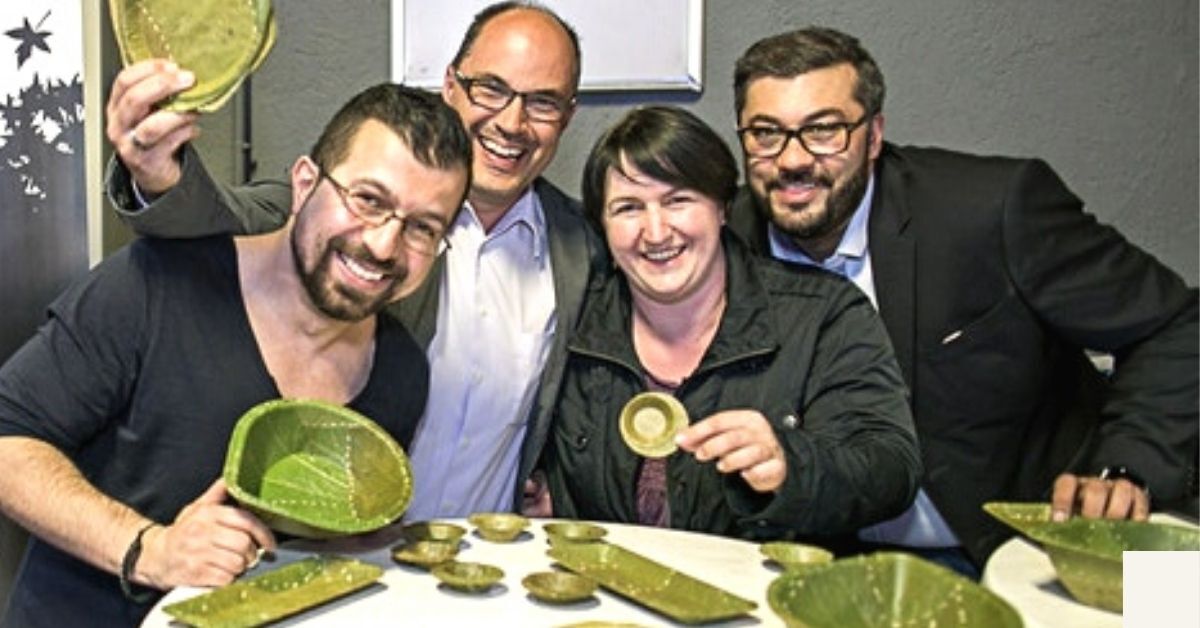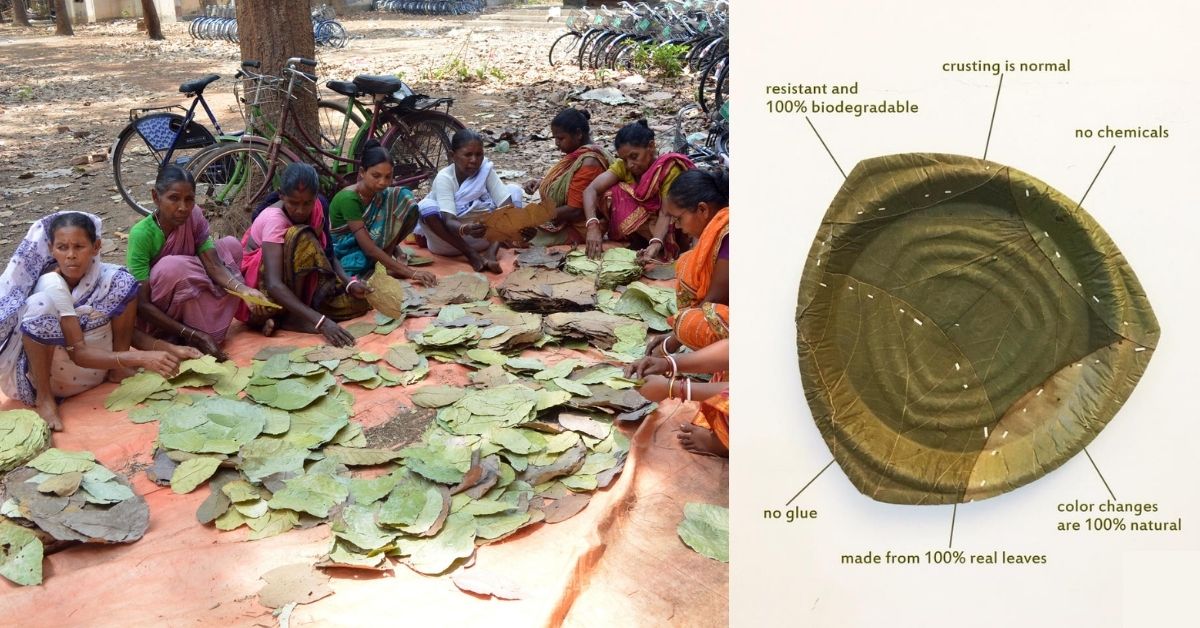German Firms Rediscover Centuries-Old Indian Leaf Plates; Sell For Over Rs 800 a Piece
After the Indian-styled toilet became ‘Squatty Potty’ and the humble haldi doodh’s makeover into chai-tea latte, the age-old pattal utensils also got an 'innovative' spin in the West.

Editor’s Note: As confirmed by the founders, Leaf Republic has now shut down. This article has been updated to reflect the same, and details of another German firm engaged in the same business have been added.
I n India, it’s not just about what you eat but how you eat as well. For instance, a gulp of the world-famous flavour bomb phuchka, aka pani-puri, is never quite satisfying in a plastic or steel bowl as it is in the traditional ‘sal pata’ bowl.
Called by a variety of names like patravali, pattal or vistar, etc. the practice of eating in a plate or bowl made out of leaves is a very common practice in India. A centuries-old tradition, this holds roots in the Sutrasthana, the first chapter of Charaka Samhita, the oldest treatise on Ayurveda by Acharya Charaka. According to Acharya Charaka, who was a principal contributor in Ayurveda, the practice of eating on a leaf plate with hands encourages sparsh (touch), which is responsible for awakening all the sensory organs in the mind, making the food consumption experience truly wholesome.
From community feasts, weddings, funerals to roadside snack shops, these crinkled dried-leaf plates and bowls are everywhere, every day and are intrinsically a part of Indian culture.
Read More Like This: The $175m US Startup That Is Teaching The West How To Use The Indian Toilet
So, it was quite a shocker when a German company, Leaf Republic, launched its ‘innovative’ collection of tableware made out of leaves back in 2016, and the West pretended this was new and amazing. Presented with admirable sophistication, Leaf Republic offered a range of leaf tableware which included bowls, plates and trays.
These were made up of four layers — two layers of leaves stitched together with palm fibres, a waterproof leaf-based paper layer in the middle and a bioplastic lid on top. With their completely automated production process, they claimed they were completely organic, free from any trace of plastic, oil, glue or chemicals.
While it was always a perfect example of old wine in a new bottle, things got kicked up another notch when Mashable shared a video in 2019, claiming this was an ‘innovation’ by the Germans. This sent Indian Twitterati down a rabbit-hole of traditional and indigenous products that the West borrowed, without credit, and rebranded as ‘innovative’ and path-breaking.
Despite its impressive design and robust marketing, Leaf Republic was shut down in 2018, after an unfortunate incident where all their raw materials from India was contaminated en-route.
Strangely, Leaf Republic was not the only German company on this ‘leaves-to-table’ path. Another German company, called ‘Leef‘ has also been selling biodegradable tableware and prides itself on having ‘Europe’s broadest palm leaf product portfolio’. Leef, which advertises itself as ‘worldwide specialists’ continues to operate as one of the leading suppliers of palm leaf tableware in the catering sector in Germany.
https://twitter.com/krithikasivasw/status/1099243411230535681?ref_src=twsrc%5Etfw%7Ctwcamp%5Etweetembed%7Ctwterm%5E1099243411230535681%7Ctwgr%5E%7Ctwcon%5Es1_&ref_url=https%3A%2F%2Fwww.moneycontrol.com%2Fnews%2Ftrends%2Fgerman-company-that-sells-innovative-leaf-tableware-gets-schooled-by-desi-tweeple-3581241.html
After the Indian-styled toilet became ‘Squatty Potty’ and the humble haldi doodh’s makeover into chai-tea latte, this looks like another case of colonisation of indigenous products.
Leaf Republic’s motto – “Because we spend only a brief moment on this world” – might have been a cryptic justification for the cultural amnesia these companies suffer from. Such forgetfulness fuels conveniently ignorant innovations that precariously balance on the borders of cultural appropriation.
However, it’s not just a case of a plagiarised ‘innovation’ being sold at whopping prices – Leaf Republic sold them for £8.50 (Rs 873) apiece, while Leef still sells the plates at € 11.50 (Rs 1000) apiece.
The big point here is the irony it reflects.
Read More: Cot in the Act: ‘Vintage Indian Daybeds’ Sell for Profit of 5000% In New Zealand
Leaf utensils have for decades fueled cottage industries in modern India and several Asian countries. These cottage industries were revitalised during India’s freedom struggle in an effort to economically beat the colonizers. Now their products, rebranded by the West as ‘innovative’ and ‘one-of-a-kind’, turned this idea upside down.

While we appreciate the West finally embracing more eco-friendly products like these in their daily lives, it would have been better if the plagiarism was avoided to give way to more empowerment, like it was done by Hyderabad-based startup, Vistaraku.
The startup, founded by Venugopal and Madhavi Vippulancha in 2019, makes similar leaf utensils. The good folks at Vistaraku have not only given credit where it’s due but also ensured its business helps cottage industries in Telangana and Andhra Pradesh thrive. Thanks to them, hundreds of rural women now have a livelihood and financial independence. Now that’s how it’s done!
(Edited by Yoshita Rao)
If you found our stories insightful, informative, or even just enjoyable, we invite you to consider making a voluntary payment to support the work we do at The Better India. Your contribution helps us continue producing quality content that educates, inspires, and drives positive change.
Choose one of the payment options below for your contribution-
By paying for the stories you value, you directly contribute to sustaining our efforts focused on making a difference in the world. Together, let’s ensure that impactful stories continue to be told and shared, enriching lives and communities alike.
Thank you for your support. Here are some frequently asked questions you might find helpful to know why you are contributing?


This story made me
-
97
-
121
-
89
-
167











